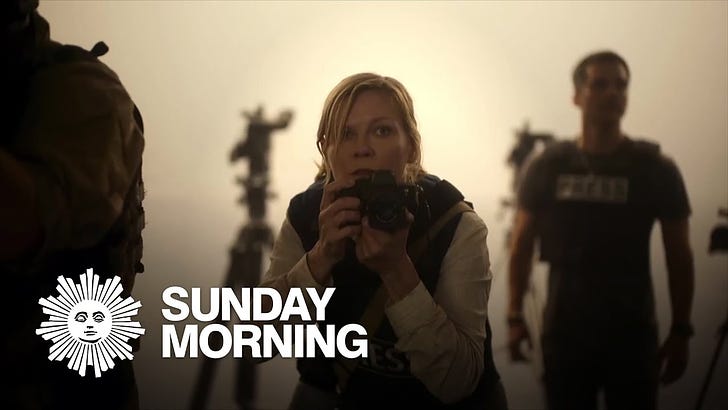"Civil War" the new film project by Kirsten Dunst and Alex Garland
Is this a thought-provoking new cautionary tale, or an accerationist fantasy?
In theaters now is a new film featuring Actor Kirsten Dunst featuring the nightmare scenario of Americans at war with each other.
“Every time I survived a war zone, I thought I was sending a warning home: Don’t do this,” a photojournalist laments in Alex Garland’s speculative thriller, Civil War. “But here we are.” Like her namesake Lee Miller, who captured on film the Battle of Alsace and the liberation of the Buchenwald and Dachau concentration camps in the Second World War, Lee Smith (Kirsten Dunst) observes and chronicles the worst of humanity. America has collapsed, as the Western Alliance, struck between California and Texas (with a little help from Florida), closes in on Washington DC and a president (Nick Offerman) who’s given himself a third term.
Lee, alongside fellow Reuters reporter Joel (Wagner Moura), New York Times veteran Sammy (Stephen McKinley Henderson), and Lee superfan Jessie (Cailee Spaeny), vows to land the only story left in this wasteland of a country: an interview with the now-doomed president. British writer-director Garland, with his valuable outsider perspective, shoots exactly as if he were making a modern war movie about a conflict elsewhere. Civil War is its own warning home: don’t do this.
And yet it falls frustratingly short, having collapsed into the same thematic issues as Garland’s previous work, 2022’s Men. There, the director had Jessie Buckley chased around a small village by men with the same face (specifically, Rory Kinnear’s face). It may have effectively monsterised men, but it never dared to question the system that empowered one gender to commit consequence-free terror and subjugation. Civil War, too, decontextualises violence and deliberately tosses the entire idea of power out the window.
We’re never told what this conflict is about, who might be oppressed, or what freedoms have been stolen away. All we’re given is violence. And, to Garland’s credit, he’s made an utterly convincing war film about a war that’s yet to break out, having relinquished the taut control that made his more traditional sci-fi films, Ex Machina and Annihilation, feel so eerie.
There is some value in showing us what America could potentially become if we continue to divide against each other. There’s value in making the death, destruction and damage look and feel real, as if it’s something tangible and that it has consequences.
But that’s only telling half the story. It would be more honest to tell every why we having these conflicts because in order to resolve them, we need to address the source of them — and this movie doesn’t do that.
This is a point that I’ve made before. I’ve directly stated that the Civil War is already in progress. It’s just a mostly Cold War right now, carried about by Lone Stochastic Terrorists. We’ve only had one serious mass event so far - the January 6 Insurrection.
But there could certainly be more.
I’m not alone in that view as Jeff Sharlet’s new book “Undertow: Scenes from a Slow Civil War” makes clear.
An unmatched guide to the religious dimensions of American politics, Jeff Sharlet journeys into corners of our national psyche where others fear to tread. The Undertow is both inquiry and meditation, an attempt to understand how, over the last decade, reaction has morphed into delusion, social division into distrust, distrust into paranoia, and hatred into fantasies—sometimes realities—of violence.
Across the country, men “of God” glorify materialism, a gluttony of the soul, while citing Scripture and preparing for civil war—a firestorm they long for as an absolution and exaltation. Lies, greed, and glorification of war boom through microphones at hipster megachurches that once upon a time might have preached peace and understanding. Political rallies are as aflame with need and giddy expectation as religious revivals. At a conference for incels, lonely single men come together to rage against women. On the Far Right, everything is heightened—love into adulation, fear into vengeance, anger into white-hot rage. Here, in the undertow, our forty-fifth president, a vessel of conspiratorial fears and fantasies, continues to rise to sainthood, and the insurrectionist Ashli Babbitt, killed on January 6 at the Capitol, is beatified as a martyr of white womanhood.
Framing this dangerous vision, Sharlet remembers and celebrates the courage of those who sing a different song of community, and of an America long dreamt of and yet to be fully born, dedicated to justice and freedom for all.
For Trump. For Ashli. For the “J6 Hostages.”
They will fight.
Keep reading with a 7-day free trial
Subscribe to Dark Skies on the Horizon to keep reading this post and get 7 days of free access to the full post archives.



